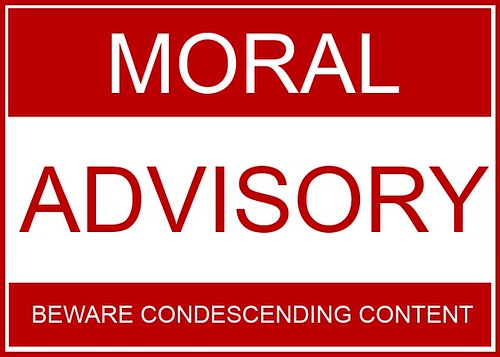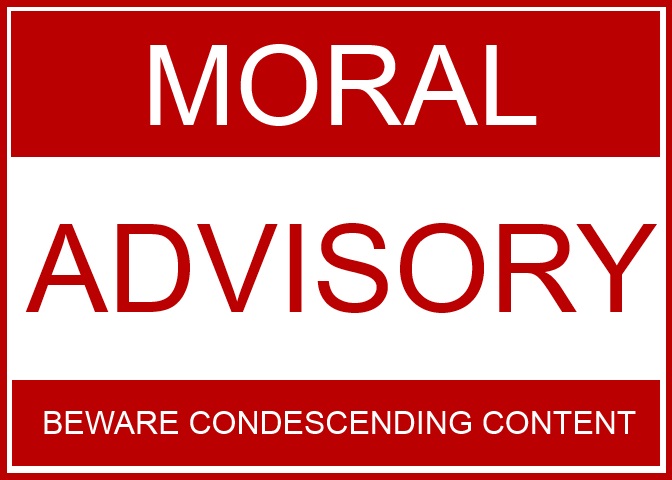
There seems to be a pervasive theme among the Mormon culture. It is not overtly outspoken (I think because there is no way to say it without really sounding like a jerk), but it is there in the underbelly of many Gospel Doctrine classes. The idea is that Mormons have the monopoly on righteousness, on truth, on access to the Holy Ghost, and on salvation in general. To be fair, I don’t think that Mormons are totally unique in this. Much of Christianity exhibits a similar pride. Mormons just take a special edge to it because, you know, we have the “fullness of the Gospel” and “the Gift of the Holy Ghost”.
I’m really not sure where this attitude comes from. I know that we believe there are certain requirements (ordinances and whatnot) that are necessary for entry into the Kingdom of Heaven. But, we also believe that there is more than one way to satisfy those requirements (like proxy). So, it doesn’t seem like we’ve any right to look toward our fellow man here on earth and assume we have any kind of edge over them.
But there are hoards of Mormons who (intentionally or not) work under the assumption that they have a moral superiority. They assume that they have a better understanding of God, of righteousness, of scripture, or the meaning of life… And so they assume that they are also more primed for salvation than their fellow man. This makes me think of Doctrine and Covenants 18:20, “Contend against no church, save it be the church of the devil.” If we are making those assumptions about our monopolies on all things gospel, we are unintentionally contending against other churches, religions, and people. Because we are creating a knowledge barrier, creating an us and a them, that doesn’t really exist. And one of the biggest problems with this is that when we run into someone that doesn’t see things the way we do, it becomes too easy to jump to the conclusion that this is because we just know more (or have better beliefs and/or more faith) than they do.
I actually learned recently that there are still whole groups of Mormons that believe that “the church of the devil” (or the “great and abominable church” or the “great whore of all the earth” and other fun lingo) is a reference to the one and only Roman Catholic Church. (Oh, Mormon Doctrine, when will we be able to quit you?) In their honor, I’d like to share this recent quote from Pope Francis:
 “The Lord created us in His image and likeness, and we are the image of the Lord, and He does good and all of us have this commandment at heart: do good and do not do evil. All of us. ‘But, Father, this is not Catholic! He cannot do good.’ Yes, he can… “The Lord has redeemed all of us, all of us, with the Blood of Christ: all of us, not just Catholics. Everyone! ‘Father, the atheists?’ Even the atheists. Everyone!”.. We must meet one another doing good. ‘But I don’t believe, Father, I am an atheist!’ But do good: we will meet one another there.”
“The Lord created us in His image and likeness, and we are the image of the Lord, and He does good and all of us have this commandment at heart: do good and do not do evil. All of us. ‘But, Father, this is not Catholic! He cannot do good.’ Yes, he can… “The Lord has redeemed all of us, all of us, with the Blood of Christ: all of us, not just Catholics. Everyone! ‘Father, the atheists?’ Even the atheists. Everyone!”.. We must meet one another doing good. ‘But I don’t believe, Father, I am an atheist!’ But do good: we will meet one another there.”
I’m gonna ignore the fact that other hierarchy in the Catholic church came out and made statements afterwards that watered this one down. And Catholics should ignore that too, right? Because the Pope is infallible, right? But, I digress. The point is that I wholeheartedly believe in what Pope Francis was saying, and believe that Mormons should apply it to our own faith. Indeed, I think that is what Joseph Smith believed, too, because he taught that “as a mighty God, our Heavenly Father has the capacity to save us all. As a fond father, He has the desire to do so. That is why, as Joseph taught, ‘God hath made a provision that every spirit can be ferreted out in that world’ that has not deliberately and definitively chosen to resist a grace that is stronger than the cords of death.”
Joseph Smith also taught, “If the Presbyterians have truth, embrace that. If the Methodists, have truth embrace that too. Get all the good in the world if you want to come out a pure Mormon.” Indeed, Brother Joseph seemed to fully recognize that truth can be found anywhere. And not just that, but that if we aren’t seeking that out, we are the ones that will miss out on something. That is not “monopoly” talk. That is “seek out truth wherever you can find it because it may be something you need” talk. Which makes perfect sense, because we also believe that The Spirit of Christ is given to every man… (Moroni 7:16), and if we truly believe it is given to every man, then we must accept that we are not alone is receiving revelation, understanding, discernment, inspiration, faith, or salvation.
Beware the religion that turns you against another one. It’s unlikely that it’s really religion at all.
–Joan D. Chittister (Benedictine Nun, for the record)





I have several struggles with our beloved church these days and this is high on the list.
I feel like along with this pervasive attitude we also undermine other peoples’ religious/spiritual experiences. Some how if they’re not “mormon” experiences they aren’t true blue experiences.
And I so vehemently disagree. Other people of other religions – have wonderful, heartfelt, deep, convicting experiences. It’s wrong to want to invalidate them.
You can feel the spirit in those places and under different conditions. Possessing “the Gift of the Holy Ghost” does not give LDS members sole access to the Holy Ghost. Or Christ or Heavenly Father for that matter!
Now I’m all irritated. I blame you, Leah. :p
I had this mentality on my mission
Do you think that had a positive or negative effect on your interactions with investigators? (or no effect at all I suppose)
Oh I’m sure it was pretty negative for most.
We all get to grow up spiritually. For me, part of that process involved moving from the righteousness monopoly mentality to the inclusiveness mindset that Joseph spoke of and that you perfectly referenced here. Thank you for that. And for this whole post.
The church is growing up too, thank goodness. It’s a great time to be a Mormon. Like Joanna Brooks said to Jon Stewart on the daily show, “We’re 180 years old [as a religion]. We’re babies.”
Newbies!!
It’s funny you should mention that Melody. After that interview, I had several friends who were super insulted that she spoke about our religion that way. Because, you know, we are “THE religion”. As old as Adam and Eve, as they say.
Their anger notwithstanding, it is an absolutely accurate notion. The church is changing and we are just barely learning to walk as religions go. There is hope for the future.
I also think this actually gets in the way of our own spiritual progress. This attitude is epitomized in all the comments in Gospel Doctrine and RS (I assume it happens in priesthood as well) that begin with, ” I have this friend–she’s not a member of the church–and…” These comments go on to talk about how this friend failed to live the gospel principle being discussed and went on to suffer for that. Or about how this friend understands repentance or marriage or death or whatever in a different way than Mormons and “it’s just so sad”.
When our gospel discussions center around how short everyone else is coming up, and what they are missing out on, WE end up missing out on the opportunity to examine our own shortcomings and to think about how WE can improve. Talking about what other churches don’t have or “know” does nothing to help them or us. It’s just an arrogant, polarizing exercise in futility.
It is interesting, isn’t it, that we even go so far as to define everyone else as “not us”. We don’t call them Catholics, or Methodists, or Muslims… we call them “non-members”. That is the way we define them, as not one of us. And then we go on to talk about why we are better off.
The thing that gets me about the kind of discussion you’re talking about, is that when we are warned about these things in the scriptures – the importance of repentance or whatever – we tend to talk about these things like, “It is so good that we have this knowledge, and it is so sad that others don’t.” And the result is that we are the ones that aren’t internalizing those messages, because we are assuming the “non-members” need the messages more than we do. We’re totally passing the buck and missing out on the opportunity to better our own understanding of the gospel.
Yeah….my favorite line goes along with what you said Adrienne…”she’s not a member of the church, but she’s a really good person.” Theres always that clarification on there and emphasis added that in spite of their nonmembership in the church they are still good people, as if you cant be a good person and not be a member of the church
Where did Joseph’s universalism go? Leah, will you site the sources for Joseph’s quote?
Mike, it is linked to take you to the source that I got it from.
very nice post.